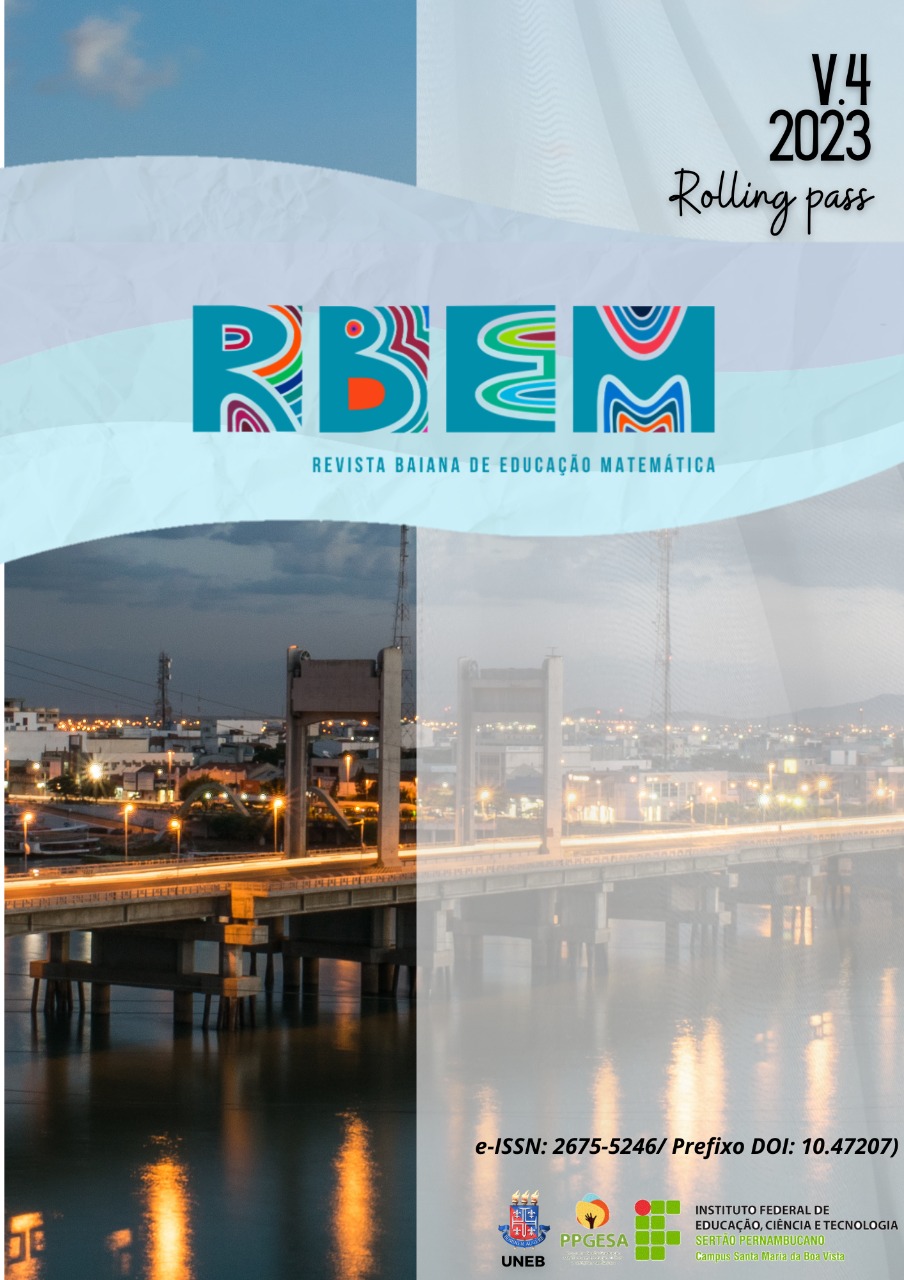TEACHING MATHEMATICAL CONCEPTS: AN EXPERIENCE WITH A STUDENT WITH DOWN SYNDROME
Main Article Content
Abstract
The present work aims to report and discuss the experience of teaching mathematical concepts to students with Down syndrome enrolled in the final years of elementary school at a private school in Fortaleza, Ceará. The practices mentioned here are based on ten months of daily monitoring of the student by the authors and, over the course of these months, we seek to understand how the relationship between the teacher who teaches mathematics and the specificities of these students occurs, as well as, to know the practices, interventions, teaching methodologies and strategies that guide the teacher's actions for the student's cognitive development regarding Mathematics. For this, a case study was carried out in addition to a bibliographical survey about what has been discussed regarding the topic. As a theoretical basis, we rely on studies by Bissoto (2005), Lopes & Fabris (2013), Santiago & Santos (2015) among others. It was possible to conclude that consistent planning that involves different educational actors is essential for the good performance and advancement of students with Down Syndrome, with regard to learning Mathematics, in addition to the search for a practice more focused on potential, involvement of everyone in the inclusion process is a decisive factor in success.
Downloads
Article Details

This work is licensed under a Creative Commons Attribution-NonCommercial-ShareAlike 4.0 International License.
Uma nova publicação de artigo anteriormente publicado na Revista Baiana de Educação Matemática, fica sujeita à expressa menção da precedência de sua publicação neste periódico, seguindo as normas de referência. Autores que publicam na RBEM concordam com os seguintes termos:
-
O Conselho Editorial se reserva ao direito de efetuar, nos originais, alterações de ordem normativa, sintática, ortográfica e bibliográfica com vistas a manter o padrão culto da língua, respeitando, porém, o estilo dos autores. As provas finais poderão ou não ser enviadas aos autores.
-
Autores mantém os direitos autorais e concedem à revista o direito de primeira publicação, com o trabalho simultaneamente licenciado sob a Licença Creative Commons Attribution (CC BY-NC-SA).
-
Autores têm autorização para assumir contratos adicionais separadamente, para distribuição não-exclusiva da versão do trabalho publicada nesta revista, exemplo: publicar em repositório institucional ou como capítulo de livro, com reconhecimento de autoria e publicação inicial na RBEM.
-
Autores têm permissão e são estimulados a publicar e distribuir seu trabalho online — em repositórios institucionais, página pessoal, rede social ou demais sites de divulgação científica.
References
BISSOTO, Maria Luísa. Desenvolvimento cognitivo e o processo de aprendizagem do portador de síndrome de Down: revendo concepções e perspectivas educacionais. Ciênc. cogn., Rio de Janeiro , v. 4, p. 80-88, mar. 2005 . Disponível em <http://pepsic.bvsalud.org/scielo.php?script=sci_arttext&pid=S1806-58212005000100009&lng=pt&nrm=iso>. acessos em 19 set. 2023.
BUCKLEY, S. Teaching numeracy. Down's syndrome, research and practice : the journal of the Sarah Duffen Centre / University of Portsmouth. 12. 11-4. 10.3104/updates.2031. (2007). Disponível em: https://www.researchgate.net/publication/6147765_Teaching_numeracy. Acesso em: 28 de maio de 2023.
BRASIL. Resolução n. 2, de 11 de fevereiro de 2001. Institui Diretrizes Nacionais para a Educação Especial na Educação Básica. Disponível em: http://portal.mec.gov.br/seesp/arquivos/txt/res2.txt. Acesso em: 07 abril. 2022.
D’AMBRÓSIO, U. Da realidade à ação: reflexões sobre educação e matemática. São Paulo: Summus; Campinas: Ed. Da Universidade Estadual de Campinas, 1986. Disponível em: https://books.google.com.br/books?id=yj3dTmKneVoC&printsec=frontcover&hl=pt-BR&source=gbs_ge_summary_r&cad=0#v=onepage&q&f=false. Acesso em: 27 maio de 2023.
FERREIRA, G. L. A relação das Professoras da sala de recursos/apoio e da sala regular para o Ensino de Matemática de alunos com deficiência do Ensino Fundamental I. Tese de Doutorado (Educação Matemática) – PUC/SP, São Paulo, 2014.
GOODE, W. J.; HATT, P. K. Métodos em pesquisa social. São Paulo: Nacional, 1975.
LOPES, M. C.; FABRIS, E. H. Inclusão & educação. Belo Horizonte. Autêntica: 2013.
MANTOAN, M. T. E. (org.). & LANUTTI, J. E. O. E. (org.). Todos pela inclusão escolar dos fundamentos às práticas.Curitiba: CRV, 2021.
MINAYO, M. C. de S (org.). Pesquisa Social. Teoria, método e criatividade. 18 ed. Petrópolis: Vozes, 2001.
MOREIRA, G. E. Educação matemática inclusiva:diálogos com as teorias da atividade, da aprendizagem significativa e das situações didáticas. São Paulo: Editora Livraria da Física, 2019.
SANTIAGO, M. C., & SANTOS, M. P. dos. (2015). Planejamento de Estratégias para o Processo de Inclusão: desafios em questão. Educação & Realidade, 40(2). Recuperado de https://seer.ufrgs.br/index.php/educacaoerealidade/article/view/45248. Disponível em <https://seer.ufrgs.br/educacaoerealidade/article/view/45248>. acessos em 19 set. 2023.
VIGOTSKI, L. S. Obras Escogidas V fundamentos de defectología. Edición em lengua castellana. Visor Dis. S.A., 1997.
VYGOTSKY, L. S. A formação social da mente. São Paulo: Martins Fontes, 1989. Pensamento e linguagem. São Paulo: Martins Fontes, 1987.
YOKOYAMA, L. A. Matemática e Síndrome de Down. Rio de Janeiro: Ciência Moderna Ltda, 2014.

